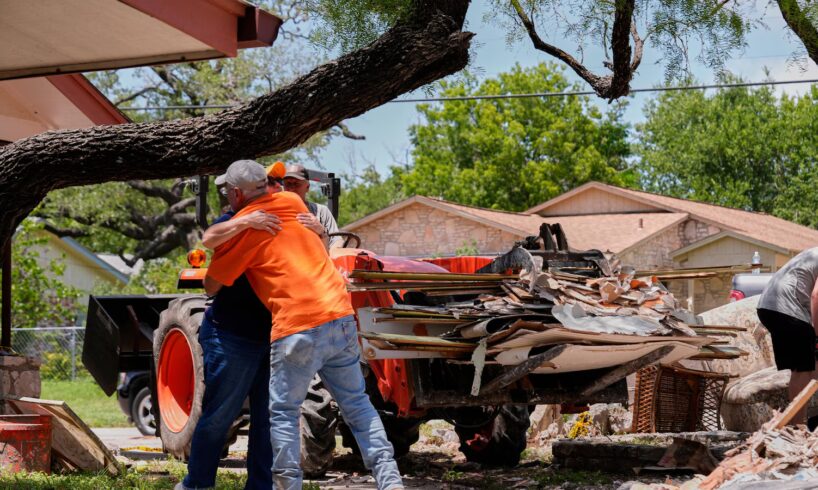
State officials on the front lines of preparing for natural disasters and responding to emergencies say severe cuts to federal security grants, restrictions on money intended for readiness and funding delays tied to litigation are posing a growing risk to their ability to respond to crises.
It’s all causing confusion, frustration and concern. The federal government shutdown isn’t helping.
“Every day we remain in this grant purgatory reduces the time available to responsibly and effectively spend these critical funds,” said Kiele Amundson, communications director at the Hawaii Emergency Management Agency.
The uncertainty has led some emergency management agencies to hold off on filling vacant positions and make rushed decisions on important training and purchases.
Experts say the developments complicate state-led emergency efforts, undermining the Republican administration’s stated goals of shifting more responsibility to states and local governments for disaster response.
In an emailed statement, the Department of Homeland Security said the new requirements were necessary because of “recent population shifts” and that changes to security grants were made “to be responsive to new and urgent threats facing our nation.”
Several DHS and FEMA grants help states, tribes and territories prepare for climate disasters and deter a variety of threats. The money pays for salaries and training, and such things as vehicles, communications equipment and software.
State emergency managers say that money has become increasingly important because the range of threats they must prepare for is expanding, including pandemics and cyberattacks.
FEMA, a part of DHS, divided a $320 million Emergency Management Performance Grant among states on Sept. 29. But the next day, it told states the money was on hold until they submitted new population counts. The directive demanded that they omit people “removed from the State pursuant to the immigration laws of the United States” and to explain their methodology.
The amount of money distributed to the states is based on U.S. census population data. The new requirement forcing states to submit revised counts “is something we have never seen before,” said Trina Sheets, executive director of the National Emergency Management Association, a group representing emergency managers. “It’s certainly not the responsibility of emergency management to certify population.”
With no guidance on how to calculate the numbers, Hawaii’s Amundson said staff scrambled to gather data from the 2020 census and other sources, then subtracted he number of “noncitizens” based on estimates from an advocacy group.
They are not sure the methodology will be accepted. But with their FEMA contacts furloughed and the grant portal down during the federal shutdown, they cannot find out. Other states said they were assessing the request or awaiting further guidance.
In its statement, DHS said FEMA needs to be certain of its funding levels before awarding grant money, and that includes updates to a state’s population due to deportations.
Experts said delays caused by the request could most affect local governments and agencies that receive grant money passed down by states because their budgets and staffs are smaller. At the same time, FEMA also reduced the time frame that recipients have to spend the money, from three years to one. That could prevent agencies from taking on longer-term projects.
Bryan Koon, president and CEO of the consulting firm IEM and a former Florida emergency management chief, said state governments and local agencies need time to adjust their budgets to any kind of changes.
“An interruption in those services could place American lives in jeopardy,” he said.
In another move that has caused uncertainty, FEMA in September drastically cut some states’ allocations from another source of funding. The $1 billion Homeland Security Grant Program is supposed to be based on assessed risks, and states pass most of the money to police and fire departments.
New York received $100 million less than it expected, a 79% reduction, while Illinois saw a 69% reduction. Both states are politically controlled by Democrats. Meanwhile, some territories received unexpected windfalls, including the U.S. Virgin Islands, which got more than twice its expected allocation.
The National Emergency Management Association said the grants are meant to be distributed based on risk and that it “remains unclear what risk methodology was used” to determine the new funding allocation.
After a group of Democratic states challenged the cuts in court, a federal judge in Rhode Island issued a temporary restraining order on Sept. 30. That forced FEMA to rescind award notifications and refrain from making payments until a further court order.
The freeze “underscores the uncertainty and political volatility surrounding these awards,” said Frank Pace, administrator of the Hawaii Office of Homeland Security. The Democratic-controlled state received more money than expected, but anticipates the bonus being taken away with the lawsuit.
In Hawaii, where a 2023 wildfire devastated the Maui town of Lahaina and killed more than 100 people, the state, counties and nonprofits “face the real possibility” of delays in paying contractors, completing projects and “even staff furloughs or layoffs” if the grant freeze and government shutdown continue, he said.
The myriad setbacks prompted Washington state’s Emergency Management Division to pause filling some positions “out of an abundance of caution,” communications director Karina Shagren said.
Emergency management experts said the moves have created uncertainty for those in charge of preparedness.
The Trump administration has suspended a $3.6 billion FEMA disaster resilience program, cut the FEMA workforce and disrupted routine training.
Other lawsuits also are complicating decision-making. A Manhattan federal judge last week ordered DHS and FEMA to restore $34 million in transit security grants it had withheld from New York City because of its immigration policies.
Another judge in Rhode Island ordered DHS to permanently stop imposing grant conditions tied to immigration enforcement, after ruling in September that the conditions were unlawful — only to have DHS again try to impose them.
Taken together, the turbulence surrounding what was once a reliable partner is prompting some states to prepare for a different relationship with FEMA.
“Given all of the uncertainties,” said Sheets, of the National Emergency Management Association, states are trying to find ways to be “less reliant on federal funding.”





